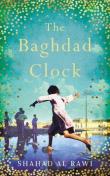
by Shahad Al Rawi
Paperback-
LONGLISTED FOR THE INTERNATIONAL PRIZE FOR ARABIC FICTION 2018 For fans of The Kite Runner comes this remarkable debut, the number one bestselling ...
Overall rating:
How would you rate this book?
Member ratings
The Baghdad Clock, Shahad Al Rawi
I enjoyed reading this book. I kept wanting to pick it up again, each time I put it down which is a sign to me that the book is calling my name, but, if truth be told, I had to reread many a sentence over and over, and even then, I am not sure I got the full meaning of the author’s intent. Whether it was due to the editing or the translation, I do not know. Imagination and magical realism often ran through the pages creating a fantasy which was sometimes difficult to understand or discern its inner meaning.
The book had a cryptic quality, as if the author was deliberately composing riddles for the reader to solve. At the same time, alternatively, the prose was lyrical and filled with clarity and simplicity.
In shared dreams that defied reality, with a dog that seemed anthropomorphic, and neighbors who behaved oddly, the story plays out as if Iraq is a ship that once rode high, peacefully, upon the water, but was now adrift, tossing and turning and could not be saved. The overarching theme of the story seems to be that war is fruitless with unpredictable results that are often poorly received depending on the vantage point.
In the late summer of 1990, Saddam Hussein invaded Kuwait. He was given an ultimatum to leave. Failing that, Iraq would be attacked by United Nations coalition forces, led by the United States. Now, in the novel, it is 1991, and two young girls have met each other in a bomb shelter. They develop a kinship which remains over the next decade+ in Iraq, as they live through war, sanctions and war again, only to, each time, try to pick up and rebuild their lives from the remnants left. Many grow weary of war and the negative changes it brings with it. They move on into an uncertain future, especially this generation that knew of nothing else but chaos in their young lives.
Through the eyes of a nameless child, the reader will witness the events of the war and the children’s ability to adjust to it, even as they deal with their fear and their dreams for a future which quickly collapses and reassembles in different forms. They think about philosophical questions, about the purpose of the wars, the accomplishments of the wars and what possible benefits were expected from them besides the inevitable loss of life and destruction of property. As the child ponders life and death, love and hate, fear and courage, the reader will wonder about these things with them. It is a sharp analysis, if not sometimes over my head, of human emotions, survival instincts, methods of coping with stress and dealing with anxious moments and situations beyond our control.
On the wings of the dreams and hopes of the young girls and some of the elderly residents of the community, the reader sees life change from hopeful to hopeless and then sometimes, back to hope again, albeit in a different shape, unless hope gives out altogether.
The Baghdad clock symbolizes their country and its four faces the rest of the world. In the end, they lose the clock and their country as the soothsayer predicted, to disaster and exile.
Book Club HQ to over 90,000+ book clubs and ready to welcome yours.
Get free weekly updates on top club picks, book giveaways, author events and more








